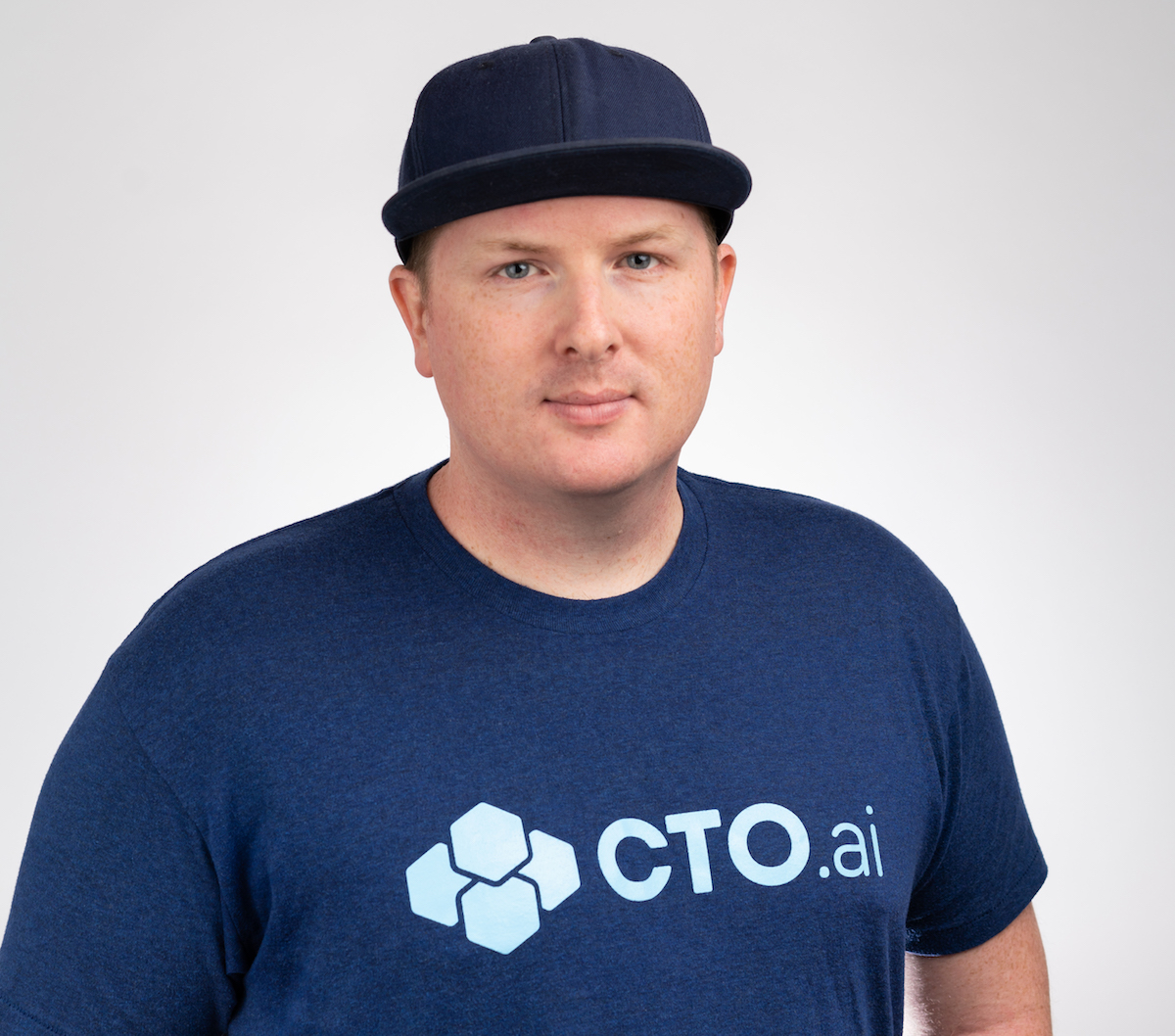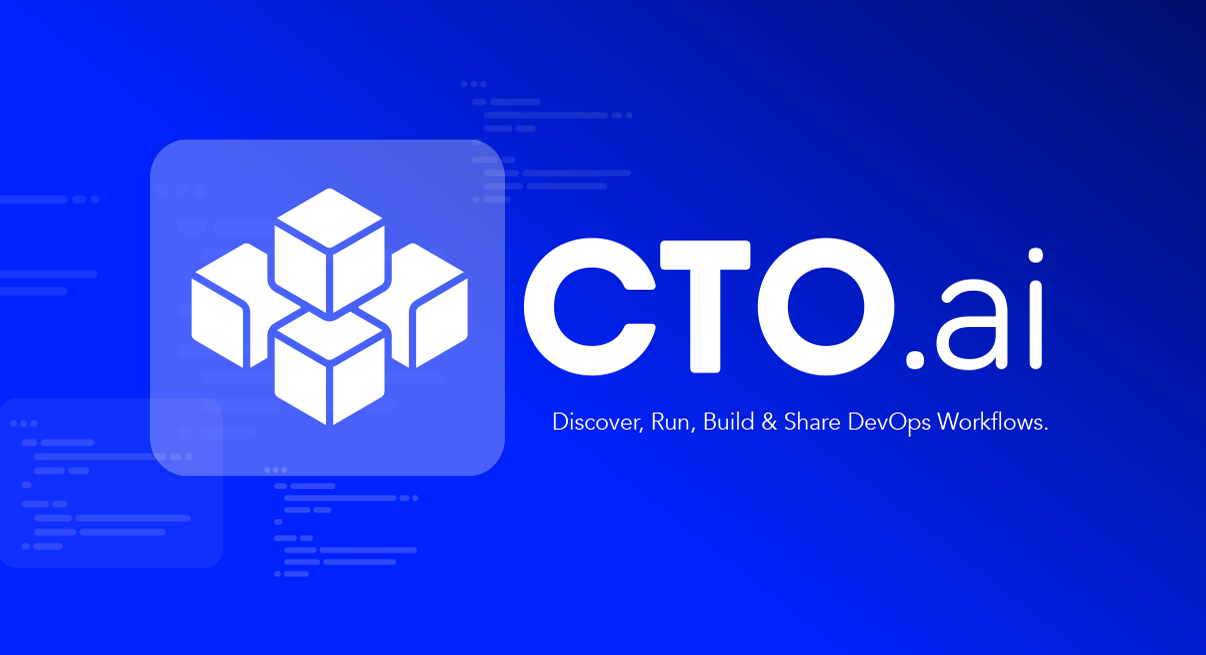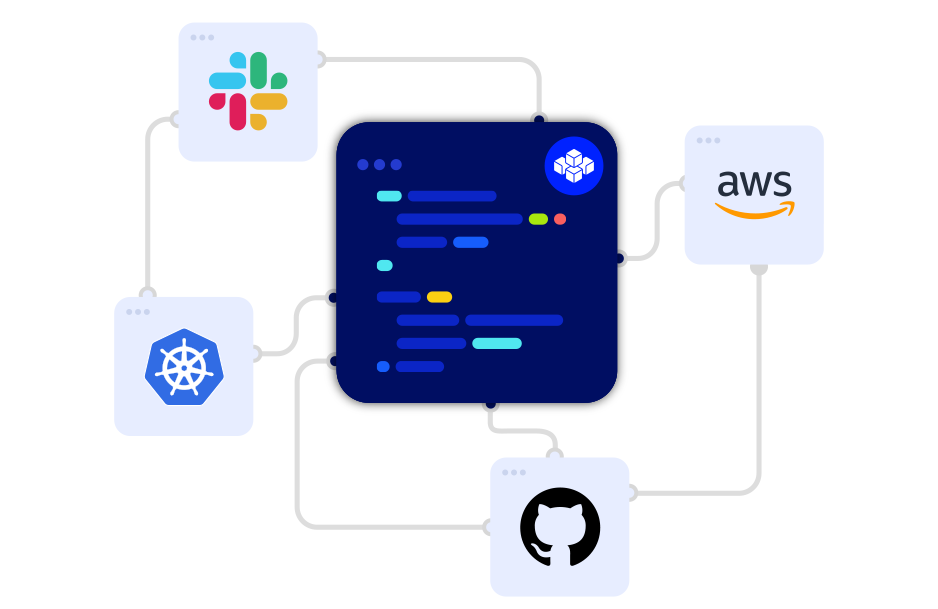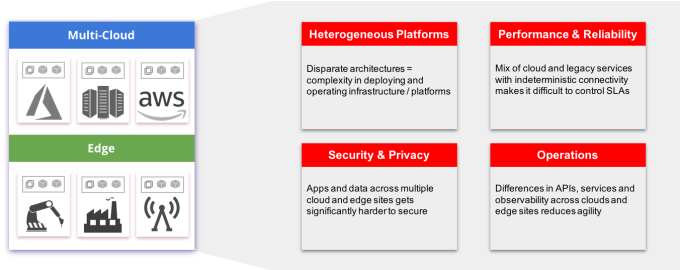Recent Funding
Auto Added by WPeMatico
Auto Added by WPeMatico
There’s too much hype about mythical “10X developers.” Everyone’s desperate to hire these “ninja rockstars.” In reality, it’s smarter to find ways of deleting annoying chores for the coders you already have. That’s where CTO.ai comes in.
Emerging from stealth today, CTO.ai lets developers build and borrow DevOps shortcuts. These automate long series of steps they usually have to do manually, thanks to integrations with GitHub, AWS, Slack and more. CTO.ai claims it can turn a days-long process like setting up a Kubernetes cluster into a 15-minute task even sales people can handle. The startup offers both a platform for engineering and sharing shortcuts, and a service where it can custom build shortcuts for big customers.

What’s remarkable about CTO.ai is that amidst a frothy funding environment, the 60-person team quietly bootstrapped its way to profitability over the past two years. Why take funding when revenue was up 400% in 18 months? But after a chance meeting aboard a plane connected its high school dropout founder Kyle Campbell with Slack CEO Stewart Butterfield, CTO.ai just raised a $7.5 million seed round led by Slack Fund and Tiger Global.
“Building tools that streamline software development is really expensive for companies, especially when they need their developers focused on building features and shipping to customers,” Campbell tells me. The same way startups don’t build their own cloud infrastructure and just use AWS, or don’t build their own telecom APIs and just use Twilio, he wants CTO.ai to be the “easy button” for developer tools.

“I’ve been a software engineer since the age of 8,” Campbell recalls. In skate-punk attire with a snapback hat, the young man meeting me in a San Francisco Mission District cafe almost looked too chill to be a prolific coder. But that’s kind of the point. His startup makes being a developer more accessible.
After spending his 20s in software engineering groups in the Bay, Campbell started his own company, Retsly, that bridged developers to real estate listings. In 2014, it was acquired by property tech giant Zillow, where he worked for a few years.

That’s when he discovered the difficulty of building dev tools inside companies with other priorities. “It’s the equivalent of a snake swallowing an elephant,” he jokes. Yet given these tools determine how much time expensive engineers waste on tasks below their skill level, their absence can drag down big enterprises or keep startups from rising.
CTO.ai shrinks the elephant. For example, the busywork of creating a Kubernetes cluster such as having to the create EC2 instances, provision on those instances and then provision a master node gets slimmed down to just running a shortcut. Campbell writes that “tedious tasks like running reports can be reduced from 1,000 steps down to 10,” through standardization of workflows that turn confusing code essays into simple fill-in-the-blank and multiple-choice questions.

The CTO.ai platform offers a wide range of pre-made shortcuts that clients can piggyback on, or they can make and publish their own through a flexible JavaScript environment for the rest of their team or the whole community to use. Companies that need extra help can pay for its DevOps-as-a-Service and reliability offerings to get shortcuts made to solve their biggest problems while keeping everything running smoothly.
Campbell envisions a new way to create a 10X engineer that doesn’t depend on widely mocked advice on how to spot and capture them like trophy animals. Instead, he believes one developer can make five others 2X more efficient by building them shortcuts. And it doesn’t require indulging bad workplace or collaboration habits.
With the new funding that also comes from Yaletown Partners, Pallasite Ventures, Panache Ventures and Jonathan Bixby, CTO.ai wants to build deeper integrations with Slack so developers can run more commands right from the messaging app. The less coding required for use, the broader the set of employees that can use the startup’s tools. CTO.ai may also build a self-service tier to augment its seats, plus a complexity model for enterprise pricing.

Now it’s time to ramp up community outreach to drive adoption. CTO.ai recently released a podcast that saw 15,000 downloads in its first three weeks, and it’s planning some conference appearances. It also sees virality through its shortcut author pages, which, like GitHub profiles, let developers show off their contributions and find their next gig.
One risk is that GitHub or another core developer infrastructure provider could try to barge directly into CTO.ai’s business. Google already has Cloud Composer, while GitHub launched Actions last year. Campbell says its defense comes through neutrally integrating with everyone, thereby turning potential competitors into partners.
The funding firepower could help CTO.ai build a lead. With every company embracing software, employers battling to keep developers happy and teams looking to get more of their staff working with code, the startup sits at the intersection of some lucrative trends of technological empowerment.
“I have a three-year-old at home and I think about what it will be like when he comes into creating things online,” Campbell concludes. “We want to create an amazing future for software developers, introducing automation so they can focus on what makes them such an important aspect. Devs are defining society!”
[Image Credit: Disney/Pixar via WallHere Goodfon]
Powered by WPeMatico
Volterra is an early-stage startup that has been quietly working on a comprehensive solution to help companies manage applications in hybrid environments. The company emerged from stealth today with a $50 million investment and a set of products.
Investors include Khosla Ventures and Mayfield, along with strategic investors M12 (Microsoft’s venture arm), Itochu Technology Ventures and Samsung NEXT. The company, which was founded in 2017, already has 100 employees and more than 30 customers.
What attracted these investors and customers is a full-stack solution that includes both hardware and software to manage applications in the cloud or on-prem. Volterra founder and CEO Ankur Singla says when he was at his previous company, Contrail Systems, which was acquired by Juniper Networks in 2012 for $176 million, he saw first-hand how large companies were struggling with the transition to hybrid.
“The big problem we saw was in building and operating applications that scale is a really hard problem. They were adopting multiple hybrid cloud strategies, and none of them solved the problem of unifying the application and the infrastructure layer, so that the application developers and DevOps teams don’t have to worry about that,” Singla explained.
He says the Volterra solution includes three main products — VoltStack, VoltMesh and VoltConsole — to help solve this scaling and management problem. As Volterra describes the total solution, “Volterra has innovated a consistent, cloud-native environment that can be deployed across multiple public clouds and edge sites — a distributed cloud platform. Within this SaaS-based offering, Volterra integrates a broad range of services that have normally been siloed across many point products and network or cloud providers.” This includes not only the single management plane, but security, management and operations components.

Diagram: Volterra
The money has come over a couple of rounds, helping to build the solution to this point, and it required a complex combination of hardware and software to do it. They are hoping organizations that have been looking for a cloud-native approach to large-scale applications, such as industrial automation, will adopt this approach.
Powered by WPeMatico
Robotic Process Automation (RPA) has been a hot commodity in recent years as it helps automate tedious manual workflows inside large organizations. Robocorp, a San Francisco startup, wants to bring open source and RPA together. Today it announced a $5.6 million seed investment.
Benchmark led the round, with participation from Slow Ventures, firstminute Capital, Bret Taylor (president and chief product officer at Salesforce) and Docker CEO Rob Bearden. In addition, Benchmark’s Peter Fenton will be joining the company’s board.
Robocorp co-founder and CEO Antti Karjalainen has been around open-source projects for years, and he saw an enterprise software category that was lacking in open-source options. “We actually have a unique angle on RPA, where we are introducing open source and cloud native technology into the market and focusing on developer-led technologies,” Karjalainen said.
He sees a market that’s top-down and focused on heavy sales cycles. He wants to bring the focus back to the developers who will be using the tools. “We are all about removing friction from developers. So, we are focused on giving developers tools that they like to use, and want to use for RPA, and doing it in an open-source model where the tools themselves are free to use,” he said.
The company is built on the open-source Robot Framework project, which was originally developed as an open-source software testing environment, but he sees RPA having a lot in common with testing, and his team has been able to take the project and apply it to RPA.
If you’re wondering how the company will make money, they are offering a cloud service to reduce the complexity even further of using the open-source tools, and that includes the kinds of features enterprises tend to demand from these projects, like security, identity and access management, and so forth.
Benchmark’s Peter Fenton, who has invested in several successful open-source startups, including JBoss, SpringSource and Elastic, sees RPA as an area that’s ripe for a developer-focused open-source option. “We’re living in the era of the developer, where cloud-native and open source provide the freedom to innovate without constraint. Robocorp’s RPA approach provides developers the cloud native, open-source tools to bring RPA into their organizations without the burdensome constraints of existing offerings,” Fenton said.
The company intends to use the money to add new employees and continue scaling the cloud product, while working to build the underlying open-source community.
While UIPath, a fast-growing startup with a hefty $7.1 billion valuation recently announced it was laying off 400 people, Gartner published a study in June showing that RPA is the fastest growing enterprise software category.
Powered by WPeMatico
With roughly one million customers across Brazil and a new round of financing, the mobile phone insurance provider Pitzi now finds itself with a $100 million valuation.
The size of its latest round, which was led by QED Investors and included commitments from existing investors like Thrive Capital and Valiant Partners, was undisclosed.
PItzi acts as a reseller for insurance companies to offer products around mobile phone insurance across Brazil. Founded in 2012, the company’s mobile handset insurance offerings were a service that was in the right place at the right time, as low-cost handsets caused the market in Latin America’s most populous country to explode.
Pitzi previously raised $20 million from investors, including Thrive, Kaszek Ventures, Flybridge and DCM. Even with the company’s success, cell phone insurance in Brazil stands at 4%, compared with global standards of more than 40%. This despite the fact that there are more than 200 million phones in Brazil alone.
“Today, only 4% of smartphones here are protected but we’re driving that towards 90% in the coming years and using those phones to unlock even more transformation in the space,” said Daniel Hatkoff, founder and CEO of Pitzi, in a statement.
The investment by QED Investors puts Pitzi in some pretty good company when it comes to Latin American financial technology startups. Other Latin American investments in the firm’s portfolio include the multibillion-dollar credit card startup, Nubank; the personal finance lender, Creditas; the business lender, Konfio; and the rental financing company Quinto Andar.
As a result of the investment, Bill Cilluffo, a former president of Capital One International and a general partner with QED, will take a seat on the company’s board of directors, according to a statement.
For Hatkoff, the cell phone is a window into other products and services in the insurance industry thanks to the ways the device has transformed so many experiences for the emerging Brazilian middle class.
“The smartphone will be profoundly transformational in Brazil, allowing the emerging middle class to finally emerge and do things it never imagined possible,” said Hatkoff. “As market leaders, we at Pitzi are obsessed with unlocking the Brazilian consumer’s ability to use their phones in ever more powerful ways. Cell phone protection is just the beginning.”
Powered by WPeMatico
Software development companies tackling services for niche industries, like commercial real estate subcontracting, continue to find Los Angeles to be fertile ground for development.
The latest company to raise funding from a clutch of investors is BuildOps, which raised $5.8 million in seed financing from some big names in the Los Angeles tech ecosystem.
Led by Fika Ventures, with additional investments from MetaProp VC, Global Founders Capital, CrossCut Ventures, TenOneTen, IGSB, 1984 Ventures, L2 Ventures, GroundUp, NBA all-star Metta World Peace, Oberndorf Enterprises, Wolfson Group and scouts from Sequoia Capital, the new financing will be used to support the company’s continued growth.
BuildOps sells software that integrates scheduling, dispatching, inventory management, contracts, workflow and accounting into a single software package for commercial real estate contractors with staff ranging from a few dozen to several hundred employees.
Software for the service industry is nothing new for Los Angeles entrepreneurs. The unicorn ServiceTitan hails from the greater Los Angeles area and a number of other software as a service businesses are calling the greater Los Angeles area home.
It’s hard to argue with the size of the commercial construction market. Over the past three years, commercial construction spending grew from $626 billion to $807 billion, according to data provided by the company. And while most large vendors — architects, general contractors and property management companies — have some project management software, the fragmented group of subcontractors that provide services to those customers has remained resistant to adopting new technologies, the company said.
The firm was co-founded by former ServiceTitan developer Neeraj Mittal; Microsoft, Nextag, Swurv and Fundly former executive Steve Chew; and Alok Chanani, who previously founded a commercial real estate company and was a former commander of a transportation unit of the Army in Iraq.
“At BuildOps, we are on a mission to bring a true all-in-one solution on the latest technology to the people who keep America’s hospitals, power plants and commercial real estate running. We are privileged to be working closely with some of the country’s top commercial contractors,” said Chanani.
That sentiment is echoed by Liquid 2 Ventures managing partner and former National Football League superstar, Joe Montana .
“Liquid 2 Ventures has an investment thesis in supporting America’s working class and I just love the idea of making their lives far easier and better. You have one solution that does it all and talks seamlessly to every single part of their business from parts to ordering to inventory and more,” said Montana in a statement. “There are very few world-class technology solutions for commercial subcontractors like this and we believe in the founders.”
Powered by WPeMatico
If you work for someone else, you likely know the drill: in comes that annual email reminding you that it’s time for unconscious bias or sexual harassment training, and if you could please finish up this mandatory module by this date, that would be terrific.
The email — not to mention the programming itself — is straight out of “Office Space.” Little surprise that when Anne Solmssen, a Harvard-trained computer scientist, happened to call a friend recently who was clicking through his own company-sponsored training program, his answer to how it was going was, “It’s more interesting when I have baseball on.”
Solmssen has some other ideas about how to make sexual harassment training far more interesting and less “cringe-worthy.” Indeed, she recently joined forces with Roxanne Petraeus, another Harvard grad, to create Ethena, a software-as-a-service startup that’s promising customizable training delivered in bite-size segments that caters to individuals based on how much they already know about sexual harassment in the workplace. The software will also be sector-specific when it’s released more widely in the first quarter of next year.
The company first came together this past summer led by Petraeus, who joined the U.S. Reserve Officers’ Training Corps to help defray the cost of her Ivy League education and wound up spending seven years in the U.S. Army, including as a civil affairs officer, before co-founding an online meals marketplace, then spending a year with McKinsey & Co. to get a better handle on how businesses are run.
Petraeus says that across her experience, and particularly in the Army, she had “great leaders” who were “thoughtful about their [reports’] development goals and what was happening in their personal lives, and brought out the best in their people, rather than making them feel less than or marginalized.”
Still, she was aware that from an institutional standpoint, most harassment training is not thoughtful, that it’s a matter of checking boxes on an annual basis to ensure compliance with different state laws, depending on where an organization is headquartered. She marveled that so much of the content employees are consuming seems “designed for a 1980s law firm.”
Solmssen was meanwhile working for a venture-backed public safety software company, Mark43. She was getting along just fine, too, but when a friend put the two in touch on the hunch that their engineering talent and vision could amount to something, that instinct proved right.
“I’d been working for Mark43 for four years, and I wasn’t particularly interested in starting a business,” Solmssen says. “But I fell in love with Roxanne and this idea, and I came to this thinking that someone needs to make [this training process] better. We’re still using the tools and technologies that we’ve had since 1997.”
So how is what they’re building different than what’s currently available? In lots of ways, seemingly. For starters, Ethena doesn’t want employees to “knock it out all at once” in an hour or two of training at the end of each year. Instead, it’s creating what it calls monthly “nudges” that deliver relevant studies and questions on a monthly basis — information that can then be used in an all-hands meeting, for example, helping to reinforce its goals.
It’s also focused on sending content and questions to people that’s iterative and that evolves based on how an individual responds. A new hire might answer very differently than a sponsor of other women within an organization, for example. It’s a stark contrast to to the black-and-white scenarios that every employee is typically presented. (Think: “Judy and Brian go to a bar after work.”)
These subtleties are a significant development, argues Petraeus, because “traditional training implicitly tells employees that going to spending time together outside of work is bad for mentorship. It’s why you hear things like, ‘I just hired my first female analyst; can I get into an Uber with her when we’re traveling?’ ” Turning every mixed-gender occasion into a potential minefield is “not the message we should be conveying.”
Yet it’s a message that’s being absorbed. According to a survey conducted earlier this year by LeanIn.Org and SurveyMonkey, 60% of managers who are men are now uncomfortable participating in a common work activity with a woman, such as mentoring, working alone or socializing together. That’s a 32% jump from a year ago. According to that same survey, senior-level men are now 12 times more hesitant to have one-on-one meetings with junior women, nine times more hesitant to travel together and six times more hesitant to have work dinners together.
Even the U.S. Equal Employment Opportunity Commission thinks sexual harassment training has gone wrong somewhere, noting that it hasn’t worked as a prevention tool in part because it’s been too focused on simply avoiding legal liability. Indeed, a few years ago, a task force studying harassment in the workplace on behalf of the EEOC concluded that “effective training cannot occur in a vacuum – it must be part of a holistic culture of non-harassment that starts at the top.” Similarly, it added, “one size does not fit all: training is most effective when tailored to the specific workforce and workplace and different cohorts of employees.”
Toward that end, and with compliance in mind, Ethena is also modernizing the content it delivers, including as it pertains to dating at work, which definitely happens; and inclusivity around pregnant colleagues, who are often subtly marginalized; and transgender colleagues, who can also find themselves feeling either misunderstood or overlooked by current sexual harassment training materials.
There’s also a heavy focus on analytics. If 60% of employees don’t know about a company’s policies around office dating, for example, or employees in an outfit’s marketing department appear to know less about an organization’s values than other departments, it will flag these things so managers can take preventative action. (“Say there’s a new manager in the LA office where employees seem to be answering less consistently,” suggests Solmssen. “We can provide additional training to get that person up to speed.”)
For Petraeus — who is the daughter-in-law of retired general and former CIA director David Petraeus — the overarching goal is to kill off mandatory yearly training where the takeaway for many employees, the fundamental standard, is, “Can I go to jail for this comment?”
It’s too soon to say if Ethena will be successful. It’s only halfway through a pilot training program at the moment. But Solmssen and Petraeus are strong pitchmen, and they say their software will be available beginning in the first quarter of next year for $4 per employee per month, which is on a par with other e-learning programs.
The startup has also won the support of early backers who’ve already given the months-old outfit $850,000 to start hiring. Among those investors: Neo, a venture fund started last year by serial entrepreneur Ali Partovi; Village Global; and Jane VC, which is a fund focused on women-led startups.
Numerous angel investors have also written Ethena a check, including Reshma Saujani, who is the founder of the organization Girls Who Code, and a handful of military veterans.
As for the last group, “they’re not a group that’s typically represented in startup ventures,” observes Petraeus, “but in terms of leadership and thinking about how to get a diverse team oriented around the same goal,” they’re hard to match.
Powered by WPeMatico
Climate risk, including extreme events and the related pressures our environment, are fundamentally affecting the way businesses and governments operate — both tactically and strategically. Increasing climate volatility is causing food supply disruptions and increasing pressure on Enterprises (including financial institutions, insurers and producers) to disclose what’s going on.
The trouble is, while there is a lot of data about all this, its complexity, incompleteness and sheer volume is too vast for humans to process with the tools available today. So just as the climate changes, we are faced with “data chaos.” Equally, other parts of the world suffer from data scarcity, making it much harder to provide useful and timely analysis.
So the challenge is to address these issues simultaneously. So a new startup, Cervest, has created an AI-driven platform designed to inform the decision-making capabilities of businesses, governments and growers in the face of increasing climate volatility.
Cervest, has now closed a £3.7 million investment round to fund the launch of its real-time, climate forecasting platform.
The round was led by deep-tech investor Future Positive Capital, with co-investor Astanor Ventures . The seed-stage funding round brings the company’s total funding to more than £4.5 million.
Built on three years of research and development by a team of scientists, mathematicians, developers and engineers, Cervest says its Earth Science AI platform can analyze billions of data points to forecast how changes in the climate will impact the future of entire countries, right down to individual landscapes.
It does this by combining research and modeling techniques taken from proven Earth sciences — including atmospheric science, meteorology, hydrology and agronomy — with artificial intelligence, imaging, machine learning and Bayesian statistics.
Using large collections of satellite imagery and probability theory, the platform can identify signals, or early-warning signs, of extreme events such as floods, fires and strong winds. It also can spot changes in soil health and identify water risk.
Cervest says the platform could do such things as reveal the optimum location to build a new factory; warn a wheat grower that their crop yield isn’t expected to meet its targets; or be used by insurers to help them set premiums for the next 12 months.
The team comes from a network of more than 30 universities, including Imperial College, The Alan Turing Institute, Cambridge, UCL, Harvard and Oxford, and has published more than 60 peer-reviewed scientific papers.
A beta version of the platform is due to launch in Q1 2020.
Iggy Bassi, founder & CEO, Cervest said: “Our goal is to empower everyone to make informed decisions that improve the long-term resilience of our planet. Today decision-makers are struggling with climate uncertainty and extreme events and how they are affecting their business operations, assets, investments, or policy choices.”
Sofia Hmich, founder, Future Positive Capital said: “With reports suggesting we have fewer than 60 years of farming left unless drastic action is taken, the need for science-backed decisions could not be greater. Businesses and policymakers hold the key to change and with access to Cervest’s proprietary AI technology they can start to make that change a reality at low cost — before it’s too late.”
Bassi previously ran the impact-led agribusiness GADCO, which was supported by Acumen Fund, Soros, Gates Foundation, World Bank and Syngenta . Its impact was featured in UNDP, World Economic Forum, FT, The Guardian and Huff Post. He previously built a software company focused on data analytics.
Cervest was inspired by Bassi’s experience building a farm-to-market agribusiness whilst confronting first-hand the impacts of climate and natural resource volatilities.
The Cervest team includes eight scientists and four PhDs. Between them, they have published more than 60 peer-reviewed scientific papers with more than 3,000 citations in high-profile titles, including Nature, Proceedings of the National Academy of Sciences and The Royal Statistical Society.
Powered by WPeMatico
Accusonus, the Greece and U.S.-based AI company helping content creators improve the audio in their videos, has raised $3.3 million in Series A funding.
The round is led by Athens-based Venture Friends, with participation from Big Pi, IQBility and PJ Tech, along with a syndicate of U.S.-based investors led by Michael Tzannes, who is actually the co-founder of Accusonus (and the former CEO of Aware Inc.).
Launched in 2014, Accusonus has been using AI for various audio and music applications longer than most. The company’s first product was Drumatom, which allows recording engineers to control microphone leakage (also known as bleed or spill) in drum recordings. In 2017, Accusonus followed up with the release of Regroover, an AI software instrument that un-mixes audio loops into stems so that new beat making workflows are possible.
Its products are said to have been used by engineers working with musicians such as Bob Dylan, Lou Reed, Goo Goo Dolls, Super Furry Animals, Wilco, Jennifer Lopez and many others.
However, more recently the company has developed a suite of simple-to-use tools aimed at video content and podcast producers that need to repair or “clean up” audio in their creations. With the amount of content being created growing exponentially — often recorded on smartphones and other consumer equipment or turned around quicker than ever — the market beyond music production is huge.
The company’s thinking, explained co-founder and CEO Alex Tsilfidis, is that Accusonus wants to democratise access to high-quality audio via AI-driven tools that remove the learning curve required by traditional audio software.
He says that inventing new algorithms and “painstakingly” fine-tuning the UX of Accusonus’ products has enabled it to offer audio tools that provide ease-of-use to entry-level users while simultaneously speeding up the workflows of audio and video professionals.
Specifically, the Accusonus Enhancement and Repair of Audio (ERA) tools are able to clean up audio recordings via turning a single “virtual” knob within the software. The ERA tools work as plugins and are compatible with major video and audio platforms. These include entry-level editors, such as Audacity and Garageband, and more high-end offerings, such as Adobe Premiere Pro, Apple Final Cut, Avid Pro Tools, Apple Logic Pro and Da Vinci Resolve.
Meanwhile, Tsilfidis says there is some advantage to serving both customer groups, too. The company’s professional users often provide feedback that then helps improve its non-professional targeted products (even if there is likely some overlap between the two groups).
Powered by WPeMatico
Forecast, a Denmark-based startup that has developed “AI-powered” project management software, has raised $5.5 million in new funding.
The round is led by Crane Venture Partners, with participation from existing backers SEED Capital and Heartcore. Forecast has raised $10 million in total funding to date.
Founded in late 2016, Forecast describes itself as an AI-powered project management solution that automates manual project management tasks, and brings extra visibility and predictive capabilities to project management. The idea is to help increase collaboration across teams with a better workflow and to improve planning.
Forecast claims that by using its project management software, customers reduce their administrative tasks by 20-40% and gain much better insights into “project risk, resource management and more.”
“Work is going more project-based… leading to an increased need for project management skills and expertise,” Forecast co-founder and CEO Dennis Kayser tells TechCrunch. “Plus, projects are getting more complex. Project management depends on many manual, ongoing updates to stay on time, on budget and on track. That’s why 66% of all projects fail due to human error.”
In addition, as projects become more complex and the data associated with a project increases exponentially, Kayser says the problem is getting worse, which, of course, is where machine intelligence can help. “We don’t learn from our mistakes because no one can keep track of every influencing factor to make crucial adjustments,” he adds.
To tackle this, Forecast uses AI to help keep projects on track and make project management more efficient. The software integrates with existing tools — such as Trello, Slack, Gdrive, Githum and Salesforce — and uses these various external data-points as key indicators for how well a project is running.
“[It pulls in] data from disparate systems and synthesizes it into something human-readable with powerful AI,” explains Kayser. “Everyone on your team can continue to use the tool they prefer without sacrificing dead-simple scheduling, reporting and collaboration for project managers and senior executives. With better insights and tools, project managers can be more efficient and gain insights from increasingly complex projects.”
The use of AI is proactive, too. This includes matching the best person and role to the task, automation of time registration, forecasting the size and duration of tasks and being alerted before a project is in trouble.
With regards to target customers, Kayser says that Forecast is focused on helping IT & services, marketing and computer software development companies that “rely on capacity being predictable and project delivery being successful.”
Forecast currently has “hundreds of customers” in more than 40 countries. The software has helped customers manage more than 40,000 projects with more than 1,000,000 tasks created.
Powered by WPeMatico
The founders of Seattle-based Modus cold-emailed Pete Flint, the founder of Trulia and a current managing partner at the venture capital firm NFX, for months, to no avail. In a last-ditch effort, Alex Day, Jai Sim and Abbas Guvenilir sent one more message to the investor whose real estate listings tool sold to Zillow in 2014 for $3.5 billion. They were at a coffee shop below his San Francisco office, was he interested in meeting?
Fortunately for them, he was.

Modus co-founders Abbas Guvenilir (left), Jai Sim, Alex Day (right)
Modus, a real estate startup focused on title and escrow services, is today announcing a $12.5 million Series A financing co-led by NFX’s Flint and Niki Pezeshki of Felicis Ventures. Liquid 2 Ventures and existing backers, including Mucker Capital, Hustle Fund, 500 Startups, Rambleside and Cascadia Ventures, also participated in the round.
“The first revolution in online real estate was transforming the research experience, the next revolution in the industry is transforming the transaction,” Flint said in a statement.
Modus launched in 2018 with a focus on Washington (state) real estate opportunities. The startup, led by former employees of a nearly defunct lunch delivery company, Peach, has developed software to help both agents and home buyers navigate the home closing process, which, unlike many other real estate experiences, has yet to receive a boost of innovation from startups building in the sector. That’s why Modus started with an emphasis on escrow services, though the team’s long-term vision, they explain, is to power all real estate transactions.
“When you think about communication, you think of Gmail; when you think of traveling, you think of Uber. We want to be synonymous with home closing,” Sim, the company’s executive chairman, tells TechCrunch.
Day, Modus’ chief executive officer and former head of expansion at Peach, says Modus has ambitions of becoming a sort of operating system for real estate, or “like what Stripe is for payment processing, we want to become for real estate transactions.”
Since closing its Series A financing in May — the team waited until now to make its financing information public — Modus has increased its headcount to 50 employees across product, engineering and operations. Their goal now is to provide their software to home buyers in 15 to 20 states over the next two years. To support expansion efforts, Modus plans to raise a Series B in the second or third quarter of next year.
Modus previously raised $1.8 million in seed funding.
Powered by WPeMatico